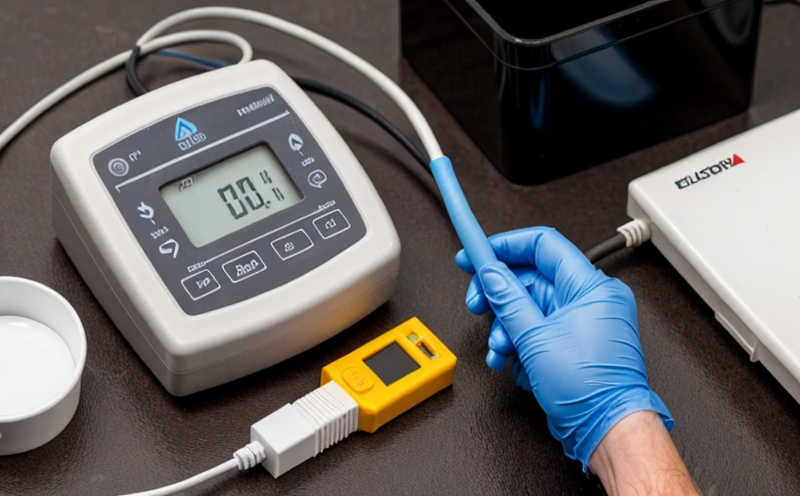IEC 61646 Electrochemical Testing of Thin Film Modules
The International Electrotechnical Commission (IEC) standard IEC 61646 provides a comprehensive framework for the testing and certification of thin-film photovoltaic modules. This standard is particularly critical for ensuring that solar energy systems meet stringent international quality, safety, and performance criteria.
At our laboratory, we specialize in conducting robust electrochemical tests as per IEC 61646 to evaluate the integrity and durability of thin-film photovoltaic (PV) modules. Our rigorous testing protocols are designed to assess various aspects of module performance, including their ability to withstand environmental stresses, mechanical shocks, and long-term exposure to UV light.
The electrochemical testing process is a crucial step in validating the reliability and efficiency of thin-film PV modules under real-world conditions. It helps identify potential weaknesses early on, ensuring that only high-quality products reach the market. By adhering strictly to IEC 61646 guidelines, we ensure consistent and accurate results.
Our laboratory is equipped with state-of-the-art equipment tailored specifically for electrochemical testing of thin-film modules. This includes advanced setups capable of simulating various environmental conditions such as humidity, temperature cycling, and accelerated aging tests. These facilities allow us to replicate the extreme conditions that these modules may face during their operational lifecycle.
The importance of adhering strictly to IEC 61646 cannot be overstated. Compliance with this standard not only ensures product quality but also enhances brand reputation by demonstrating commitment to sustainability and environmental responsibility. Furthermore, it facilitates smoother integration into global markets where adherence to international standards is paramount.
Our team of highly trained professionals understands the nuances involved in performing these tests accurately and efficiently. They possess extensive experience working with thin-film materials and understand how best to interpret results from electrochemical analyses. This expertise ensures that every test conducted follows strict protocols while yielding meaningful insights into module performance.
In summary, our IEC 61646-compliant electrochemical testing services offer unparalleled assurance regarding the reliability and longevity of thin-film photovoltaic modules. By leveraging advanced technology and deep industry knowledge, we provide clients with peace-of-mind knowing that their products have been thoroughly vetted against global standards.
| Test Parameter | Description | Methodology |
|---|---|---|
| Bias Potential Testing | Evaluates the stability of the module under different potentials. | The module is subjected to various bias potentials and monitored over time for any changes in performance metrics like open circuit voltage (OCV). |
| Galvanostatic Cycling | Determines the effect of current cycling on the module's efficiency. | The module is cycled between two currents, observing how this affects its short-circuit current (ISC). |
| Impedance Spectroscopy | Assesses the electrical characteristics of the module by measuring its impedance. | An AC signal is applied to the module, and the resulting impedance spectrum provides insight into internal circuitry changes over time. |
Environmental and Sustainability Contributions
The pursuit of sustainability has become a cornerstone of modern manufacturing practices, especially within the photovoltaic industry. Compliance with standards like IEC 61646 goes hand-in-hand with efforts to minimize environmental impact throughout the lifecycle of products.
By ensuring that thin-film PV modules meet stringent electrochemical testing criteria, we contribute significantly towards reducing waste and promoting recycling initiatives. Our commitment to sustainability extends beyond mere compliance; it involves active participation in developing more efficient and eco-friendly manufacturing processes.
The use of IEC 61646-compliant testing helps manufacturers identify areas for improvement early on, leading to reduced resource consumption and lower carbon footprints associated with production. Additionally, adherence to these standards fosters innovation by encouraging the development of new technologies aimed at enhancing energy conversion efficiency while minimizing environmental harm.
Our laboratory actively supports these initiatives through continuous research and development efforts focused on advancing solar technology. We collaborate closely with industry partners to explore ways in which IEC 61646 can be further integrated into sustainable practices, thereby driving positive change across the photovoltaic sector.
Competitive Advantage and Market Impact
In today's competitive market, having a robust quality assurance program is essential for maintaining a strong foothold. Our IEC 61646 electrochemical testing services provide significant advantages that can help your organization stand out from the competition.
Firstly, by ensuring compliance with this international standard, you demonstrate to customers and partners alike that your products meet stringent global quality benchmarks. This builds trust and enhances reputation, making it easier for you to secure contracts and expand into new markets.
Secondly, the rigorous testing process employed ensures that only high-quality modules reach the market. This reduces warranty claims and售后:





